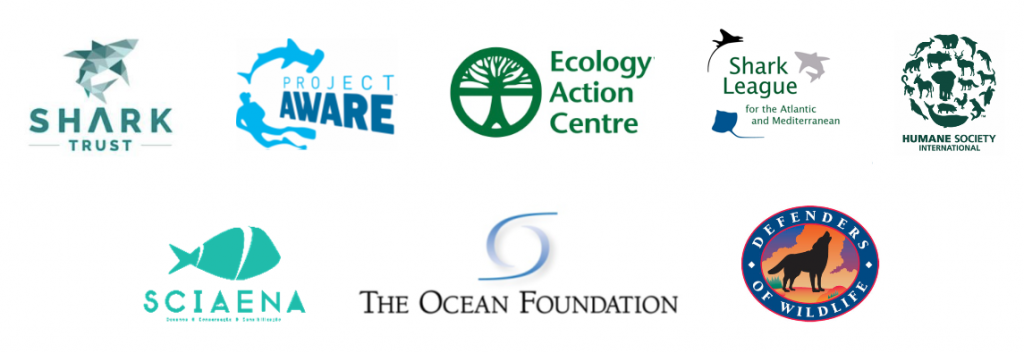The Shark Trust – with support from Ecology Action Centre, Project AWARE, Shark League, The Ocean Foundation, Defenders of Wildlife, Human Society International, and Sciaena – is exceptionally disappointed that Parties have once again delayed urgently needed measures to reverse declines in Endangered shortfin mako populations, despite prioritizing this issue as the only potential shark conservation action of the 2020 virtual negotiations. This latest failure represents blatant disregard for SCRS advice at the expense of one of the ocean’s most valuable and vulnerable shark species. We regret that we must amplify previous warnings about inaction exacerbating risk for stock collapses that are irreparable in our lifetimes.
As we underscore our commitment to ending this egregious mismanagement, we thank Canada, Senegal, the UK, Gabon, and Chinese Taipei for their shark conservation leadership. We are encouraged by the diverse and expanding array of organizations united in calls for science-based shortfin mako protections and maintain hope that Parties’ implementation of CITES obligations will also benefit the species.
We take this opportunity to underscore some key points from recent deliberations.
The SCRS has been careful, clear, and unanimous in its fundamental advice to ban retention of particularly depleted North Atlantic shortfin makos. This measure:
- Is based on TAC scenarios that incorporate all sources of mortality, including dead discards
- Was determined to be the most effective way to achieve the substantial reductions necessary
- Takes into account the species’ relatively high potential for post-release survival
- Reflects the benefits of removing financial incentives to fish for makos and encouraging movement away from hotspots, thus reducing catch, as explained by the SCRS Chair in 2019
- Was recommended in 2017 and reaffirmed in 2019 after comprehensive analyses.
Continued landings exacerbate already serious problems. Allowing retention of North Atlantic shortfin makos:
- Runs counter to SCRS advice for a non-retention policy “without exception”
- Creates incentive for irresponsible fishing practices that cause stress and ensure mortality
- Further delays a recovery period that may already span 50 years, and
- Threatens access to markets that increasingly demand sustainably fished products.
A retention ban is not a strange, novel or overly burdensome measure. Retention bans:
- Are vital to remove the incentive to encounter and kill valuable, threatened species
- Were recommended by the SCRS for shark species of concern more than a decade ago
- Have been recommended by SCRS specifically for North Atlantic shortfin makos since 2017
- Are by far the most common shark conservation measure adopted by RFMOs
- Have been mandated by ICCAT for many other shark species, including bigeye thresher, hammerhead, oceanic whitetip, and silky sharks
- Have been implemented by several ICCAT Parties for other threatened species, including basking sharks, whale sharks, and great white sharks
- Have been implemented in the Mediterranean pursuant to a GFCM prohibition, and
- Are less restrictive and economically damaging than closing entire fisheries.
A retention ban is urgent but not enough to save North Atlantic makos. We strongly support additional science-based measures to minimize incidental mako mortality as part of 2021 proposals and beyond. Such actions are recommended by the SCRS to boost recovery efforts but cannot replace the cornerstone of their advice for this depleted population (a ban on retention, without exception). Some makos will be discarded dead, whether landings are prohibited or simply limited. This reality should be mitigated over time but does not justify rejecting the advice for an immediate ban. We encourage continued research and evaluation of specific fishing gear (e.g., circle hooks, monofilament leaders, etc.) and closed areas with the potential to enhance mako recovery.
At this lamentable juncture, the best course for minimizing additional damage to both mako populations involves unilateral actions and collective prioritization to enable the intersessional agreement on science-based ICCAT measures.
To that end, we encourage the ICCAT Secretariat to immediately confirm and begin planning the July 2021 intersessional Panel 4 meeting, ensuring ample time and budget to support full participation by Parties and observers.
We call on ICCAT Parties to demonstrate an elevated priority for science-based mako management by:
- Committing or recommitting to heed SCRS advice
- Preparing to propose, promote and agree science-based mako limits (a North Atlantic retention ban and a South Atlantic TAC) at the intersessional Panel 4 meeting.
- Immediately implementing the key elements of PA4-806 through domestic regulations
- Encouraging other ICCAT Parties to actively engage in mako protection, and
While we hope that progress in combatting COVID-19 will allow for the mako-focused intersessional meeting to be conducted in-person, we stress that the pandemic can no longer be used as an excuse for policy inaction, especially with respect to warnings that have been clear for many years. Mako overfishing continues and the status of the species grows grimmer with each delay. ICCAT can and must adapt to ensure that all virtual negotiations are transparent, inclusive, and decisive.
It’s make or break for makos. Please prepare to accept the science and address this crisis at last in July.

